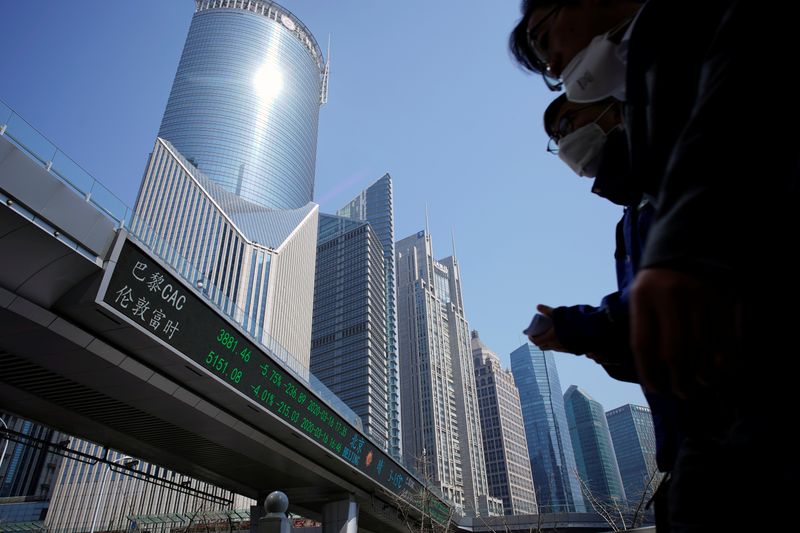LONDON (Reuters) - 1/ TESTY RELATIONS
China just concluded its closed-door annual meeting of parliament, the National People's Congress (NPC), with top officials making clear that employment is the top priority.
Fiscal stimulus worth more than 4% of GDP has been commissioned, primarily to boost jobs and incomes, but not at the expense of financial stability. Markets might want to keep one eye on the employment indicators coming out of manufacturing surveys due in coming days. Money markets are tight, the yuan is weakening. Markets are heading into June wondering if China will cut bank reserves or let the currency slip further.
But the elephant in the room is the standoff between Washington and China over Beijing’s new security legislation for Hong Kong, which many lawyers, diplomats and investors fear could erode the city's freedoms.
The weekend is packed with action: Hong Kong braces for more street protests, the U.S. administration reviews the city's special status and President Donald Trump preps a response. Whether he goes so far as to scupper his 2019 Phase 1 trade deal with China or merely takes some symbolic steps around sanctions and visas for Hong Kong citizens could determine how long the latest global stock market rally will last.
(GRAPHIC: Hong Kong trade with US, China - https://fingfx.thomsonreuters.com/gfx/mkt/nmopakljkpa/Pasted%20image%201590738264273.png)
2/JOBS, MAIN STREET, WALL STREET
The growing divergence between an increasingly dire economic landscape and a roaring U.S. stock market will be on display on Friday when May non-farm payroll employment data is reported.
The rise in weekly jobless claims since the April survey week points to another grim payroll figure for May. A Reuters poll showed economists expect U.S. employers to have cut 7.45 million jobs in May, compared with the record 20.5 million jobs lost in April.
While some encouraging signs in the employment picture have emerged in recent weeks as some workers rejoin jobs with businesses starting to reopen, these changes are unlikely to be reflected in the May data.
Any positive surprise, however, is likely to be cheered by stock market bulls eager to grasp at signs of a rebound from the coronavirus induced economic slump.
(GRAPHIC: Taking stock of payrolls data - https://fingfx.thomsonreuters.com/gfx/mkt/oakveqawyvr/NFP.jpg)
3/WHY WAIT, CHRISTINE?
On the surface, the 750 billion euro European Union plan to prop up economies hammered by the coronavirus pandemic eases pressure on the European Central Bank which has long urged Europe's leaders to do more to strengthen the bloc's economy.
So, ECB rate setters meeting on Thursday could well hold back until the EU deal is done, right? Well no, argue many economists, who believe fresh stimulus in June is more likely than not. After all, the EU recovery fund will take time to set up and will likely face hurdles on the way, they say.
In addition, the ECB is burning through its emergency asset purchases, which will likely run dry by October - unless expanded. And the unprecedented nature of the COVID-19 shock means the economic outlook remains far from certain.
Fresh ECB stimulus would likely fuel gains in southern European bonds and the euro, basking at two-month highs on the recovery fund optimism. If further ECB stimulus is matter of when not if, the key question for the ECB is, why wait?
(GRAPHIC: The ECB's QE programme - https://fingfx.thomsonreuters.com/gfx/mkt/bdwvkdamrpm/Pasted%20image%201590680791300.png)
4/DIAL #1 FOR CASH
May has been remarkable for big ticket capital raises by companies, institutional investors and shareowners with several billion dollars being raised to tackle the fallout from the virus-hit, bringing life back into equity capital markets.
In Europe, a bumper virtual coffee IPO of coffee maker JDE Peet's (AS:JDEP) is the icing on the cake.
Hard hit by coronavirus lockdowns, companies raised money in equity and bond markets to help them weather the crisis and smoothly restart their businesses as restrictions ease. Rolls-Royce (LON:RR), Whitbread (LON:WTB) and Infineon were big names in Europe. In the United States, PNC Financial (NYSE:PNC) Services' selldown of its BlackRock (NYSE:BLK) stake and Sanofi (PA:SASY) exiting Regeneron sparked a flood of deals.
The rush for cash also put the spotlight back on convertibles - selling bonds that can convert into stocks. Commerzbank (DE:CBKG) said it may sell 3-billion-euro worth contingent convertible bond.
That search of money has been more visible in the U.S. than Europe, though the levels of issuance has been well-below levels seen in the wale of the 2008 financial crisis. Meanwhile rising equity supply and falling buybacks may restrain the stock market rally, some analysts say.
(GRAPHIC: Bounce bank in markets - https://fingfx.thomsonreuters.com/gfx/buzz/jznvnbkjbvl/Pasted%20image%201590756695613.png)
5/ NOT SO STERLING
Britain heads into another round of Brexit talks ahead of the June 18-19 European Union summit by which time London needs to make up its mind about asking for an extension to the transition agreement.
British officials have repeatedly said they won't do so, but the clock is ticking and there's not much time left until the end of December when Britain and the EU part ways - with or without a trade deal.
Negotiators have not made much progress. Britain says an agreement on fisheries might not be ready by July and it is down to Brussels to break a fundamental impasse. The EU urges Britain to make a bigger effort and be more realistic about what it can achieve in these talks.
All this toing and froing keeps the pound close to its lowest in nearly three decades. And as if a potentially messy Brexit was not enough, the British currency is also grappling with the prospect of negative interest rates, a deep recession and a growing pile of debt.
(GRAPHIC: Sterling still not far from March lows - https://fingfx.thomsonreuters.com/gfx/mkt/qzjvqjwyrpx/Sterling%20still%20not%20far%20from%20March%20lows.png)
